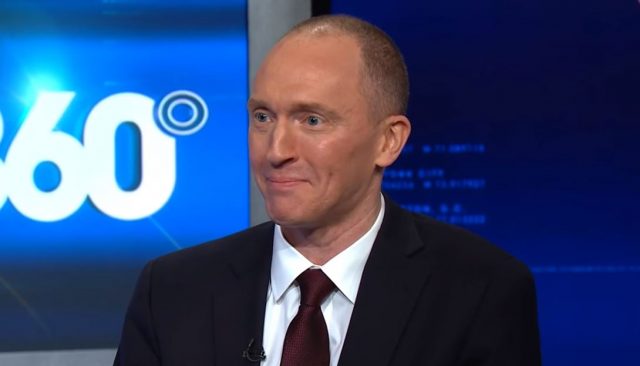 In recent days, former Trump campaign adviser Carter Page has been in headlines, and not necessarily for the best reasons. Last week, Page was interviewed by MSNBC’s Chris Hayes, and seemed to basically admit to being involved in—or at the very least aware of—collusion between the campaign and Russia. Hayes even expressed surprise at how much Page was saying on the subject. On top of that, it was learned (unsurprisingly) that Page has not retained legal counsel as he cooperates with the investigations of Special Counsel Robert Mueller, the Senate, and the House. He had already testified for hours before a Senate committee without a lawyer present, and on Monday, Page did the same before the House Intel Committee. Based on a transcript released by the committee, it went pretty much as one might expect.
In recent days, former Trump campaign adviser Carter Page has been in headlines, and not necessarily for the best reasons. Last week, Page was interviewed by MSNBC’s Chris Hayes, and seemed to basically admit to being involved in—or at the very least aware of—collusion between the campaign and Russia. Hayes even expressed surprise at how much Page was saying on the subject. On top of that, it was learned (unsurprisingly) that Page has not retained legal counsel as he cooperates with the investigations of Special Counsel Robert Mueller, the Senate, and the House. He had already testified for hours before a Senate committee without a lawyer present, and on Monday, Page did the same before the House Intel Committee. Based on a transcript released by the committee, it went pretty much as one might expect.
Adam Schiff Asking Carter Page Whether He’s Invoking The Fifth Amendment Is Something Else. pic.twitter.com/aNchV7MnTG
— Chris Geidner (@chrisgeidner) November 7, 2017
Early in the hearing, Rep. Adam Schiff (D-California) asked Page if he had complied with a subpoena calling for him to turn over documents relevant to the committee’s investigation. He replied, “I pleaded my Fifth Amendment rights, yes.” Despite claiming that is invoking the Fifth Amendment, Page also said he was ready to turn over emails that were relevant evidence.
While explaining how he should be able to hand-pick which documents he should be allowed to withhold, Page—who is not an attorney—said his concern was that he wants to help, but “in a way that does not put me in jeopardy, both judicial, in the judicial system as we’ve seen with Mr. Papadopoulos, but also with the extrajudicial punishment that I have been submitted to.” He explained that the “extrajudicial punishment” he referred to is “domestic terrorist threats” that he faced after former FBI Director James Comey spoke to Congress in March.
The odd part here, is that Page expresses fear of judicial jeopardy, even though he keeps insisting that that he did nothing wrong. His reference to George Papadopoulos is also confusing, because Papadopoulos pleaded guilty to giving false statements. It sure sounds like Page is telling the House Intel Committee that he doesn’t want to give them too much information because he doesn’t want to be caught lying. Of course, he later declared that he doesn’t lie.
Page also offered a, well let’s just say creative interpretation of the Fifth Amendment. The Fifth Amendment’s double jeopardy clause says, “nor shall any person be subject for the same offence to be twice put in jeopardy of life or limb.” While this means that a person shall not be charged more than once for the same offense, Page had a different approach. Claiming that he’s received multiple threats against himself over matters related to this, Page says that he has already been “put in jeopardy of life or limb” more than twice, so the judicial system should not be able to touch him now.
This was all before anyone even started asking about Russia.
Once again, this raises the questions: What is Carter Page doing, and why doesn’t he have a lawyer?
An attorney would have advised Page how to invoke the Fifth Amendment, and he almost certainly would have advised him not to talk to Chris Hayes on MSNBC. Most surprising, is that Page seems to have an extreme distrust of the legal system, claiming to fear judicial consequences while also claiming to be totally innocent. If he’s that worried, why not hire a professional to navigate the legal system for him?
At the very least, an attorney would give him priceless advice on when to keep his mouth shut.
[Image via CNN screengrab]
This is an opinion piece. The views expressed in this article are those of just the author.